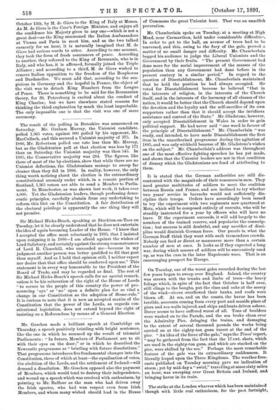Mr. Chamberlain spoke on Tuesday, at a meeting at High
Mead, near Carmarthen, held under considerable difficultie'. In order to get to the hall, an avenue of trees had to be traversed, and this, owing to the fury of the gale, proved a matter of no small danger and difficulty. Mr. Chamberlain begged his audience to judge the Liberal Unionists and the Government by their fruits. " The present Government had done more for the social improvement of the masses of the population than any Government had done before in the present century in a similar period." In regard to the question of Disestablishment, Mr. Chamberlain maintained that he held the position be had always occupied. He- voted for Disestablishment because he believed "that in the interests of religion, in the interests of the Church itself, and in the interests of the harmony of all classes of the nation, it would be better that the Church should depend upon the devotion and the loyalty and the self-sacrifice of its own supporters rather than that it should accept the invidious assistance and control of the State." Mr. Gladstone, however, only accepted Disestablishment in Wales in order to gain political support. He had never said " one word in favour of the principle of Disestablishment." Mr. Chamberlain " was- ready, and intended, to have made Disestablishment the first item in the unauthorised programme during the agitation of 1885, and was only withheld because of Mr. Gladstone's wishes on the subject." Mr. Chamberlain's address was throughout one of the most effective fighting speeches he has yet made,. and shows that the Unionist leaders are not in that condition of dismay which the Gladstonians are fond of attributing to them.


































 Previous page
Previous page